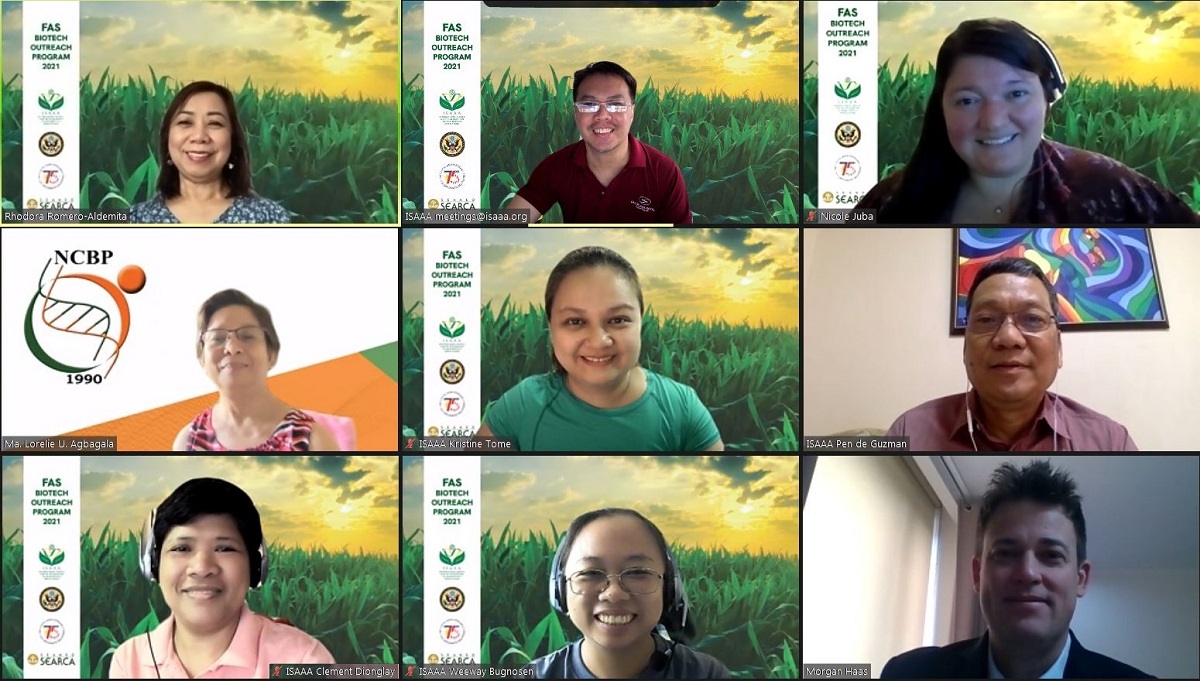
Philippines on the Right Path With Genome Editing Regulations
August 18, 2021| |
The third webinar of the Biotech Outreach Program for the Philippines 2021 hosted by ISAAA was joined by 52 participants, mostly Filipino biotechnology regulators, to learn about the latest global and national developments and regulations in genome editing research.
The event was held on August 16, 2021, via Zoom, in partnership with the Southeast Asian Regional Center for Graduate Study and Research in Agriculture (SEARCA), and the United States Department of Agriculture Foreign Agricultural Service (USDA FAS) Manila. The participants were introduced to Dr. Nicole Juba, the Regulatory Manager of Pairwise, a pioneering food start-up company based in North Carolina, USA that uses gene editing capabilities, deep crop science expertise, and the latest data techniques to cultivate fruits and vegetables. Juba discussed the global regulatory landscape for gene-edited plants, stating that several countries that have experiences with genetic modification technology are currently clarifying how existing regulations and laws will apply to the pre-market assessment of crops produced by gene editing. Though there are efforts for international coordination and harmonization, the differences in country regulations will be constant for technology developers to manage. Fortunately, these countries can also learn from each other's regulatory experiences and Juba highlighted that the regulations should be based on the product and its novelty, quality, and familiarity to extend the validity of the crop improvement continuum. To contribute to this, the regulators must be predictive rather than prescriptive, assessments must be science-based, and regulations must be accessible to all to encourage participation from all stakeholders and beneficiaries.
Ms. Ma. Lorelie U. Agbagala of the Philippine Department of Science and Technology (DOST) and Head of the Secretariat of both the National Committee on Biosafety of the Philippines and DOST Biosafety Committee, presented the status, policies, and potentials of genome editing in the Philippines. Agbagala gave updates regarding the ongoing genome editing projects in the Philippines of the International Rice Research Institute, the Philippine Rice Research Institute, and the Institute of Plant Breeding of the University of the Philippines Los Baños. More importantly, she also presented the current discussions on the drafted regulations for gene editing in the Philippines. Agbagala highlighted the features of the draft, stating that the policy is evidence-based and transparent, assures certainty by identifying that the products to be regulated are derived by new breeding techniques and does not fall within the scope of GMO regulation, and that risk assessment under the policy is based on scientific characterization of new plant cultivars. The Department of Agriculture will take the lead in evaluating and monitoring plants and plant products derived using modern biotechnology including plant breeding innovations or new plant breeding techniques.
During the open discussion, Juba expressed her enthusiasm upon learning about the progress of the Philippine regulatory system. "It sounds like the Philippines is headed in a positive direction, keep it up. I hope for the consumers to appreciate it," she said. Agbagala replied saying, "We are hoping that in the future, we can develop products by genome editing. We are hopeful for a good future for researchers in genome editing (in the Philippines)."
The webinar was moderated by Mr. Panfilo de Guzman, Associate Scientist of the ISAAA SEAsiaCenter. The opening remarks were delivered by Mr. Morgan Haas, the USDA Agricultural Counselor of the US Embassy in Manila, while the event was closed by Dr. Rhodora Romero-Aldemita, ISAAA SEAsiaCenter Director.
Two more online events will be held under the 2021 Biotech Outreach Program on Genome Editing, with the webinar intended for scientists, researchers, and technology developers scheduled on August 24, 2021, and for the general public through the SEARCA SOLVE Webinars on September 8, 2021.
For more details, contact knowledgecenter@isaaa.org. Stay updated by following ISAAA.org on Facebook, Twitter, and Instagram.
| |
You might also like:
- Filipino Policymakers, Lawyers Tackle Genome Editing
- PH Legislators and Judicial Members Engage in Agri-biotech Discussions
- Animal Biotech Online Discourses Cover Genome Editing Regulatory Approaches
Biotech Updates is a weekly newsletter of ISAAA, a not-for-profit organization. It is distributed for free to over 22,000 subscribers worldwide to inform them about the key developments in biosciences, especially in biotechnology. Your support will help us in our mission to feed the world with knowledge. You can help by donating as little as $10.
-
See more articles:
-
News from Around the World
- The Biotech Game: A Negotiation Simulation of Science Diplomacy
- The Impact of Gene Technology in Animal Agriculture and Food Production
- New Genotyping Technology to Boost Africa's Wheat Breeding Programs
- University of Illinois Study Opens Black Box of Herbicide Resistance
- Scientists Work to Improve Crops' Photosynthesis and Yields
- Researchers Develop Technique to Map Out Regulatory Switches in Maize Genome
- Gene to Make Plants Heat-Tolerant in Rising Temperatures Gets Patent
- Philippines on the Right Path With Genome Editing Regulations
- GMO Panel Finds GM Carnation Does Not Pose Risk To Health, Environment
- EFSA GMO Panel: Cotton GHB811 as Safe as Conventional Counterpart
-
Plant
- Researchers Present Prospects for Genome Editing of Potato
- IGI Works on Net-Zero Farming and Carbon Capture
-
Read the latest: - Biotech Updates (December 10, 2025)
- Gene Editing Supplement (November 26, 2025)
- Gene Drive Supplement (February 22, 2023)
-
Subscribe to BU: - Share
- Tweet

